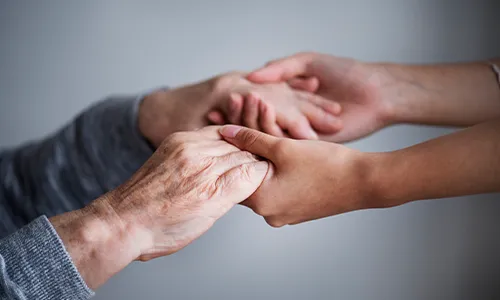- Chemotherapy
- Immunotherapy
- Targeted Therapy
- Palliative Care
- Day Care Centre
- Paxman Scalp Cooling
- Bone Marrow Evaluation
- Lymphapress
- Genetic Counselling
- Home Healthcare
- Clinical Research
- 2nd Opinion Clinic
- Psycho-Oncology
- Multi-Disciplinary Tumor Board-MDT
- Onco Nutrition
- Onco Physiotherapy
- Medical Tourism
- Yoga & Wellbeing
- Patient Support Group
- Crowd Funding


Palliative Care
Palliative care is a medical treatment designed to enhance the quality of life for people with serious or life-threatening illnesses, such as cancer. It may be administered with or without curative therapy. Along with cancer treatments that aim to stop, slow down or cure cancer, palliative care is a crucial component of medical therapy. Palliative care, according to research, can increase your quality of life and make you feel happier with your medical care. Palliative care may begin as soon as you find that you have cancer and you may continue to get it while undergoing treatment and recovering. For instance, palliative care may be provided to cancer survivors who continue to experience symptoms or side effects after their treatment has finished.
Various Aspects of Palliative Care:
- Social- You can organize a family gathering with the aid of a social worker. Offer ideas on how to coordinate volunteers. They can assist you in finding transportation, services, or medical information. For family members and carers, a social worker may also offer palliative care.
- Emotional- You can learn to recognize and manage various emotions like melancholy, worry, or rage with the aid of a support group, counselor, psychologist, or other experts.
- Mental- Exercise, therapy, meditation, and sometimes medication to treat anxiety, depression, or sleep issues are all parts of palliative care for mental health.
- Physical- Physical therapy, anti-nausea medications, and nutritional counseling are all examples of palliative care for physical side effects.
When does one need palliative care?
The purpose of your cancer treatment, which may include chemotherapy, surgery, or radiation therapy, is to lessen, stop, or ultimately eradicate the disease. One needs palliative care after the diagnosis of cancer while undergoing treatment, or even after completion of therapy when they are still experiencing side effects or symptoms.
Outcomes expected from palliative care
The physical and mental effects of cancer and its treatment might vary greatly from person to person. Palliative care integrates a patient’s unique needs into treatment to address a wide range of problems.
- Physical- Pain, exhaustion, appetite loss, nausea, vomiting, shortness of breath, and sleeplessness are some of the common physical symptoms that can be treated.
- Emotional and coping skills- Experts in palliative care can offer resources to assist patients and families cope with the emotions associated with receiving a cancer diagnosis and receiving cancer treatment.
- Spiritual- People can seek peace or come to a degree of understanding that is fitting for their condition by exploring their values and ideals with the aid of a palliative care specialist.
FAQs
- When is palliative care utilized in the treatment of
cancer?
From the time of diagnosis until the patient’s passing, palliative care can be given to them. A patient may continue receiving cancer therapy while receiving palliative care. - What distinguishes hospice from palliative
care?
Hospice care starts when the sole focus of care shifts from curative treatment to quality of life, unlike palliative care, which can start at any stage during cancer treatment. - Is there any evidence that palliative treatment is
effective?
Recent research suggests that adding palliative care to a patient’s regular cancer treatment soon
after receiving an advanced cancer diagnosis will enhance their quality of life and mood and may
even extend survival.
Book Your Appointment








